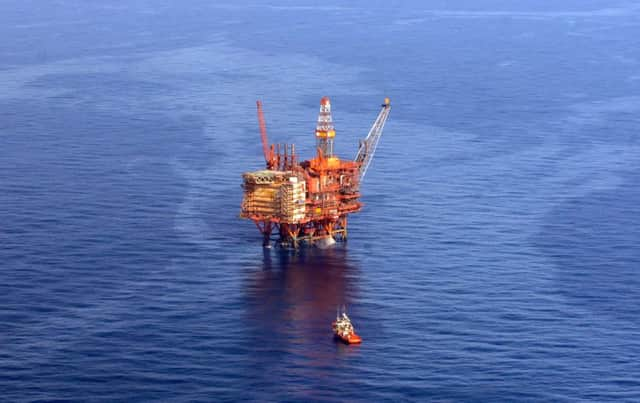Scottish Government reduces North Sea oil forecasts


The SNP administration’s latest edition of its oil and gas bulletin conceded that North Sea tax revenue could be as low as £2.4 billion from 2016/17 to 2019/20.
The figure, based on an oil price of 70 US dollars per barrel and a 5 per cent production decline per year, was the most pessimistic scenario outlined by the document.
Advertisement
Hide AdAdvertisement
Hide AdThe best-case scenario assumed oil price would go up to $100 per barrel. Combined with an increase in production, this would generate £10.8 billion in tax receipts between 2016/17 and 2019/20.
The figures released yesterday contrasted with the government’s last oil and gas bulletin, published last year a few months before the referendum.
In May 2014, the Scottish Government’s most optimistic scenario predicted that £38.7 billion would be generated between 2014/15 and 2018/19.
Last year’s most pessimistic scenario was that £15.8 billion would be generated, a figure that comfortably exceeds yesterday’s most positive projection.
The dramatic fall in the oil price to below $50 a barrel, experienced after Scotland voted against independence, has hit the North Sea industry hard with thousands of jobs being lost from the sector.
It has also prompted criticism of the SNP for making the case for independence based on the oil price estimate of $110 per barrel contained in its independence White Paper.
The government has also been criticised for the delay in updating its own forecasts. Opponents claimed ministers were reluctant to make clear how the falling oil price had damaged the case for independence.
The bulletin noted that from June 2014, the price of oil “fell by approximately 60 per cent, to around 48 US dollars in January 2015”.
Advertisement
Hide AdAdvertisement
Hide AdSince then, the document said there had been a “rebound” in the first quarter of 2015. Currently the price is around $60 per barrel.
The bulletin said that prices remained “substantially lower” then predicted by forecasters 12 months ago.
Labour accused ministers of “sneaking” the report out on the last day of the parliamentary term. Labour finance spokesperson Jackie Baillie said: “These projections are bad news for the oil industry, and both the SNP government and the UK government should explore all options to protect jobs that are directly affected and further down the supply chain.
“It is ridiculous that the SNP tried to sneak this report out on the last day of parliament. It’s clear that they have put their own political interests ahead of industry concerns. These new figures blow the SNP’s policy of full fiscal autonomy out of the water.
“We know cutting ourselves off from UK-wide taxes would blow a £7.6 billion hole in Scotland’s finances.”
Ms Baillie added: “Last week the SNP trooped through the lobbies with the extreme right wing of the Tory party to vote for full fiscal autonomy. It is as clear as day now that they knew the policy would be a disaster for Scotland – the SNP government’s own figures prove it.”
The Scottish Conservative enterprise spokesman Murdo Fraser said: “It’s clear to see we dodged a bullet when Scotland voted ‘no’ last September. The SNP government were criticised at the time for making over-projected figures.
“Now it is confirmed. If Scotland was independent we would now have a massive financial black hole to deal with. The SNP attempted to keep the public in the dark and mislead on oil prices. When will the Scottish people get an apology?
Advertisement
Hide AdAdvertisement
Hide Ad“The figures published today prove that we would face the same challenge under full fiscal autonomy. With cuts in public services and tax rises.”
The Scottish Government said that there were “considerable opportunities” to extend oil production with up to 23 billion recoverable barrels of oil equivalent remaining in the UK continental shelf (UKCS).
Deputy First Minster John Swinney said there was “no disputing” the industry has faced “a very challenging year”, adding that the Scottish Government was working relentlessly to safeguard jobs and retain skills.
He added: “These figures show considerable opportunities to extend production remain in the UKCS and, properly supported, the industry can boost production over the next five years.
“Indeed, over the longer term, the full and swift implementation of the Wood Review’s recommendations could help to bring three to four billion barrel of oil equivalent of reserves into production over the next 20 years.”